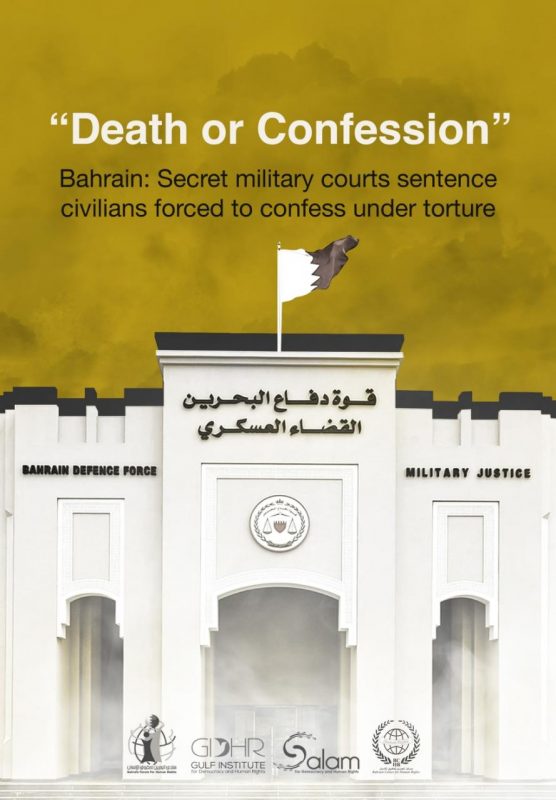Four Bahraini human rights organizations issued a report under the title of “Death or Confession“, a report that monitors the violations due to secret military courts that tried civilians whose confessions were extracted under torture. These civilian were accused of attempting to commit crimes against Bahrain Defense Force, including human rights activist Mohammed Al Mutghawi and Sayed Alawi Husain, who is the personal attendant of the highest religious cleric in Bahrain Shaikh Isa Qassim.
It is important to note that this is now the first military trial for civilians since the recent legal amendment to the military judiciary.
The human rights organizations participating in drafting and writing of this report are: Bahrain Center for Human Rights (BCHR), Bahrain Forum for Human Rights, Gulf Institute for Democracy and Human Rights (GIDHR), SALAM for Democracy and Human Rights.
The Bahrain Center for Human Rights (BCHR) said that “the trial violates fair trial procedures and that some of the accused were subjected to torture and ill-treatment”. It added: “The recent constitutional amendment to the military judiciary was used to expose them to a trial that produces harsh sentences, as well as the arbitrariness of punitive sentences against three accused persons arrested as children”, explaining that “two of the accused were forcibly disappeared around the year, namely Sayed Alawi Husain and Fadhel Abbas, without being investigated for their enforced disappearance.
The President of the Bahrain Forum for Human Rights, Baqer Darwish, said that the “judiciary did not investigate the defendants’ allegations of torture and ill-treatment. Military courts resorted to intimidating methods to threaten some of the families of victims and lawyers by exposing them to degrading treatment if violations were revealed on the media, or by human rights organizations”. He also noted “In view of this, the judiciary has used the decision to secrecy of hearings to commit abuses and to enable those involved in torturing the accused with impunity”.
Asma Darwish, the Head of International Relations in SALAM for Democracy and Human Rights, pointed out that “the right to fair trials is an inherent right of any citizen anywhere and at any time, and no one has the right to violate such rights. incompatible with these inherent rights. Therefore, the decision to try citizens in military courts must be brought to an end because they do not conform to these inherent rights”.
Yahya Al Hadid, President of the Gulf Institute for Democracy and Human Rights, criticized the “role played by the National Institute for Human Rights (NIHR) by issuing a statement praising the proceedings of the case, while it did not mention in its statement on the 14th of November 2017 that the military judiciary is not the usual judge stipulated in Article 14 of the International Covenant on Civil and Political Rights. That means the NIHR is contributing to the legitimization of the role of the military judiciary in the trial of civilians in spite of its violations to the international Military Justice Law. It also did not have a clear position on the matter of the enforced disappearance of the four defendants”.
The report recommended the repeal of the constitutional amendment and the restoration of Article 105 of the Bahraini Constitution as it was; to ensure that civilians are not tried in military courts and to repeal Law No. 12 of 2017 amending the Military Jurisdiction Law, which allowed civilians to be tried by military courts. That is to also open an independent investigation into all complaints of violations in this and other cases, concerning complaints of torture and ill-treatment.
The report also stressed that the UN Secretary-General, the High Commissioner and the members of the Human Rights Council should urge the Government of Bahrain to adopt the basic principles on the independence and application of the judiciary. That is in order to ensure that the Government of Bahrain retracts the trial of civilians in military courts and amends the law. It also urges the Special Rapporteur on the independence of judges and lawyers to request a visit to Bahrain and to call on the Bahraini authorities to accept the request for his visit.
The full report: Death or Confession



 العربية
العربية